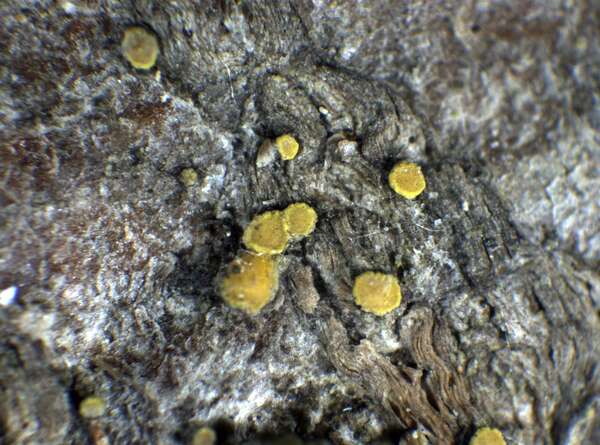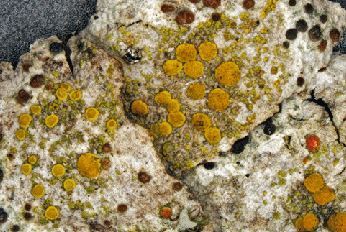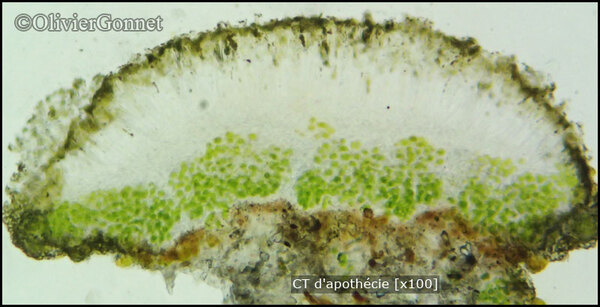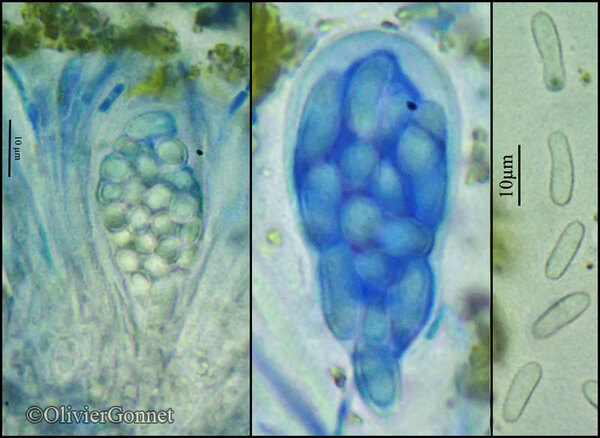Candelariella lutella (Vain.) Räsänen
Ann. Soc. Scient. Argentina, 128: 57, 1939. Basionym: Lecanora xanthostigma var. lutella Vain. - Meddeland. Soc. Fauna Fl. Fenn., 3: 102, 1878.
Synonyms:
Description: Thallus crustose, greenish yellow to pale yellow, of scattered to crowded, minute areoles or granules, forming (1-)3-5 mm wide patches at the base of small twigs or along cracks in the bark, the areoles flat to slightly convex, rounded to irregular in outline, up to c. 0.4 mm wide. Pseudocortex absent or 1-7 µm thick, of non-gelatinized hyphae with more r less isodiametrical, 3-6 µm wide cells. Apothecia common, lecanorine, 0.15-0.4(-0.6) mm wide, with a deep yellow, flat to convex disc, and a thin, uneven, entire or granular, finally often excluded thalline margin. Thalline exciple with a 5-10 µm thick pseudocortex of non-gelatinized hyphae with more or less isodiametrical, 4-6 µm wide cells; proper exciple mostly indistinct; occasionally to 50 µm thick in uppermost part, of radiating hyphae; epithecium yellow-brown, covered by a granular epipsamma; hymenium colourless, 55-75 µm high; paraphyses simple or sparingly branched in upper part, 1.5-2.5 µm thick at mid-level, with slightly swollen, to 3.5 µm wide apical cells; hypothecium colourless, with oil droplets. Asci 20-32-spored, clavate, with an apical dome which is I+ blue only in the internal, lower part, interrupted in the centre by an I+ paler blue strip, Candelaria-type. Ascospores 1-celled to 1-septate, hyaline, narrowly ellipsoid to oblong, 7-12(-13) x (3-)4-5.5 µm. Photobiont chlorococcoid. Spot tests: thallus and apothecia K- or K+ reddish-orange, C-, KC-, P-. Chemistry: calycin, pulvinic dilactone, vulpinic and pulvinic acids.
Growth form: Crustose
Substrata: bark
Photobiont: green algae other than Trentepohlia
Reproductive strategy: mainly sexual
Commonnes-rarity: (info)
Alpine belt: absent
Subalpine belt: very rare
Montane belt: very rare
Dry submediterranean belt: very rare
Humid submediterranean belt: absent
Padanian area: absent
pH of the substrata:
1 2 3 4 5
Solar irradiation:
1 2 3 4 5
Aridity:
1 2 3 4 5
Eutrophication:
1 2 3 4 5
Poleotolerance:
0 1 2 3
Altitudinal distribution:
1 2 3 4 5 6
Rarity
absent
extremely rare
very rare
rare
rather rare
rather common
common
very common
extremely common
Loading data...
Occurrence data
Predictive map
Growth form: Crustose
Substrata: bark
Photobiont: green algae other than Trentepohlia
Reproductive strategy: mainly sexual
Commonnes-rarity: (info)
Alpine belt: absent
Subalpine belt: very rare
Montane belt: very rare
Dry submediterranean belt: very rare
Humid submediterranean belt: absent
Padanian area: absent
pH of the substrata:
| 1 | 2 | 3 | 4 | 5 |
Solar irradiation:
| 1 | 2 | 3 | 4 | 5 |
Aridity:
| 1 | 2 | 3 | 4 | 5 |
Eutrophication:
| 1 | 2 | 3 | 4 | 5 |
Poleotolerance:
| 0 | 1 | 2 | 3 |
Altitudinal distribution:
| 1 | 2 | 3 | 4 | 5 | 6 |
Rarity
absent
extremely rare
very rare
rare
rather rare
rather common
common
very common
extremely common
Loading data...
Occurrence data
Predictive map










